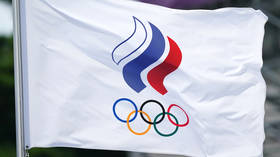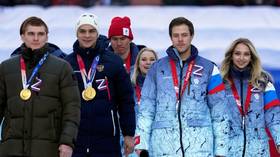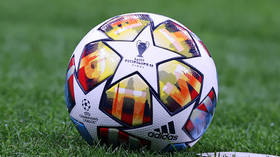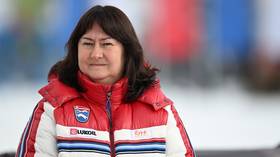Russian sports chiefs cite Soviet strengths to navigate sanctions

Russian political and sports leaders have outlined which steps are being taken to respond to widespread bans from worldwide sporting federations, with claims that the purpose of sport's main humanitarian mission is under attack.
Following an International Olympic Committee (IOC) recommendation, numerous governing bodies have excluded Russian athletes and teams from a host of competitions.
But despite the isolation in some areas, Russian Olympic Committee (ROC) president Stanislav Pozdnyakov said at the 'We Are Together. Sport' forum in Moscow on Wednesday that Russia still has "partners" who are willing to co-operate and welcome the country back into the international fold.
"The international Olympic movement is not monolithic, as the Western media are trying to show us, only the collective West is trying to break it," Pozdnyakov said.
"We have many partners who are ready to cooperate with us, but sport does not end with elite sport, it is a humanitarian mission, forums, and in this regard we see great opportunities to show everyone who is interested in our country, who loves it, what it is real."
Speaking at the same forum in the Russian capital, Deputy Prime Minister Dmitry Chernyshenko said that sport's 'humanitarian' principles are being destroyed in plain sight by the likes of the IOC.
"When we see that international sport has become the most powerful means of political struggle, when all the principles and ideals on which we grew up are violated, all the rules of the Olympic Charter are violated, and by those who did not write it, we see how the humanitarian mission of sports is being destroyed right in front of our eyes," Chernyshenko said.
"Here it is very important that we stay together. Russia has a special role that will preserve these values, despite the fact that others have wiped their feet on them."
Chernyshenko also confirmed that "appeals are being sent to international institutions to protect our athletes, to return funds, [and] to compensate the losses that our country suffered as a result of the cancelation of the rights [to host events] received in fair competition."
As it faces sanctions, Russia could borrow the strongest aspects from a Soviet-style approach, with import substitution possible.
"We are in constant contact with the industry, the federations, and are ready to respond quickly. The sanctions policy has its effect on us, but it has a healing, positive effect.
"We [will] carry out the substitution of imports. Communicating with forum participants, we answered the same questions – import substitution, the continuation of competitions, the construction of facilities, and it’s good that everyone says that we continue to hold sports competitions, build sports centers. We thank the country for its support and organization,” Chernyshenko added.
Igor Levitin, who is an assistant to President Vladimir Putin, called on Russian domestic sports to bring more self-sufficiency to the country.
"All these infringements say that we need to return to the origins of domestic sports – [which are] Soviet," he said.
"During the Soviet era, our sports experienced similar sanctions, but, in spite of everything, Soviet sports were always at a high level.
"At the present time, international sports are controlled not so much by officials [but by] the many advertising companies that manage our athletes. We need to return to the system that was in the Soviet Union, there is nothing wrong with that, it will bring us self-sufficiency," Levitin claimed.
Russian Sports Minister Oleg Matytsin also remarked on the potential strengths of that approach.
"We will also follow the regulations established in sports, we will wait for relaxations [in sanctions], or we will focus on our own resources and, using Soviet experience, we will understand in which directions our sport should develop," he outlined.
"We will understand where our shortcomings were, and together with our partners we will develop a system which will set the standard for all sport. I think it's time to be more active, to shape our vision for the future of the community," Matytsin insisted.
Chernyshenko touched on the recent events Russia held in Siberia as an alternative for Paralympic athletes who were banned from the Beijing Winter Games.
"There are mass sports and cultural events here, international open competitions. This forum is also essentially part of the 'We Are Together. Sports,' [Forum]," he said.
Pavel Rozhkov, who is President of the Russian Paralympic Committee (RPC), spoke about plans for holding international competitions alongside Russia's partners.
"We decided that this year a number of open championships will be held with the participation of the BRICS and SCO [Shanghai Cooperation Organization] countries, and we have maximally intensified relations with the National Paralympic Committee of China, whose national team is the world's leading team today," he said.
"Just the other day we received a letter from the head of the NPC of China, which says that China pays great attention to the cooperation of our countries," Rozhkov went on, adding that his federation received an invitation from the Freital Athletics Club in Germany to participate in competitions on June 25.
"And such letters come to us from other countries, from those that are called unfriendly," Rozhkov said.
Considering the ban that Russia has been handed by European football governing body UEFA, reports have circled that the Russian Football Union is considering a switch the Asian Football Confederation.
Sergei Alekseev, who is the chairman of the Sports Law Commission of the Russian Bar Association, said at the forum that the RFU could make this a reality without the need for FIFA consent as Russia is partly located in Asia too.
"But if the activities of the RFU are suspended [from FIFA], or the RFU is expelled from the organization, then it’s impossible to go anywhere," Alekseev clarified.















